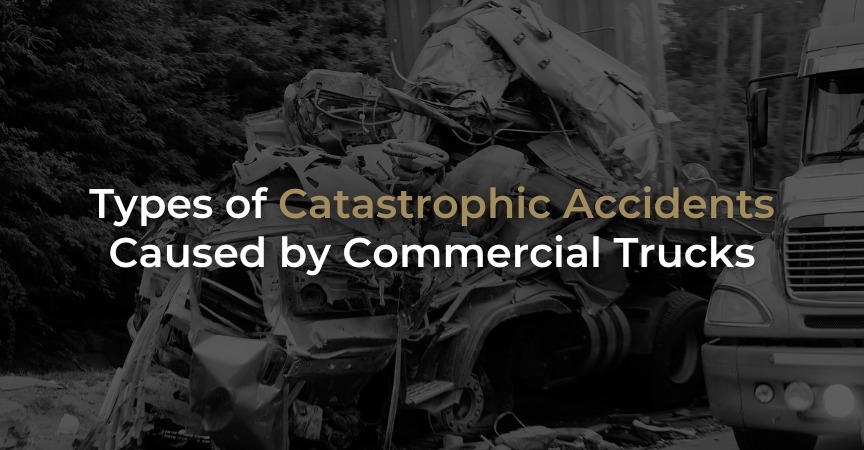While any motor vehicle crash can be devastating, incidents involving large commercial trucks are especially catastrophic given their immense size and weight. According to the National Highway Traffic Safety Administration, large trucks were involved in about 120,000 injuries and more than 5,900 fatalities in the United States in 2022. However, only 18% of those killed were the drivers or occupants of these trucks. The occupants of other vehicles account for 70% of those killed in crashes involving large trucks.
Continue reading to learn more about the common types of accidents or deaths caused by large commercial trucks.
Rollover Incidents
When trucks are moving too fast, this can result in a rollover, in which a truck tips onto its side or roof. Such incidents often result in catastrophic injuries if the truck lands on another vehicle. Commercial trucks with large trailers are particularly susceptible to rollovers, as their center of gravity is usually higher. Trucks carrying flammable materials can cause severe injuries to bystanders when a rollover results in an explosion.
If a load is not balanced or secured properly, the load may shift during a turn, adding to the likelihood of a rollover. Incidents such as these emphasize the need to secure a skilled personal injury attorney who can help you determine if a truck company’s failure to properly load the trailer caused the crash that injured you or your loved ones.
Jackknife Crashes
A commercial truck’s large mass makes it much more difficult for these vehicles to stop. But if a driver brakes too quickly, due to road conditions or an obstacle, for example, this can cause the trailer to jackknife. A trailer is usually hitched to a truck in a way that allows for some freedom of movement. During a sudden stop, the momentum of the trailer may cause it to swing forward. When this happens, the trailer may strike other vehicles or pedestrians. And because a jackknifed trailer often blocks multiple lanes of traffic, other vehicles may hit the trailer, resulting in a severe multi-vehicle crash.
Override and Underride Incidents
When a truck rear-ends a car, the truck’s height and size sometimes cause it to run over the car in front, crushing it. This is called an override. Passengers riding in the back seat of the car are more likely to sustain catastrophic injuries or death as a result of an override. When a car slides under the side or rear of a truck, due to the truck’s height, this is known as an underride. These incidents can likewise cause severe injuries to the passengers in the car.
Squeeze Play Crashes
The size of commercial trucks also means these vehicles require more room in which to execute a turn. When making a right turn, for example, a truck may first swing wide to the left to make room. If the truck driver fails to properly signal the turn, a car may then drive to the right of the truck and be trapped between it and the curb, known as a squeeze play. If you’ve been injured in this type of crash, an experienced attorney can help determine if the truck driver or company is liable.
Other Types of Truck-Related Crashes
Large trucks can also be involved in many common types of motor vehicle accidents, such as:
- Head-on collisions
- Rear-end collisions
- Side-impact collisions
- Sideswipe incidents
- Tire blowouts
- Hit and runs
- Impacts with pedestrians
- Collisions with fixed objects
- Multi-vehicle crashes
Whatever type of truck-related incident you’ve been involved with, it’s important to select an attorney with experience handling these complex cases.
Trust Your Claim to Us
The Fitzgerald Law Firm in Cheyenne, Wyoming has helped the people and families of those injured or killed in catastrophic truck crashes achieve justice for over 50 years. Our founder, Jim Fitzgerald, has been selected for membership in the Trucking Trial Lawyers Association – Top 10 list and our firm holds the record for the largest injury and death verdicts ever upheld on appeal in Wyoming.
So if you or a loved one has been in a serious accident involving a large truck, please contact us to schedule a consultation.
